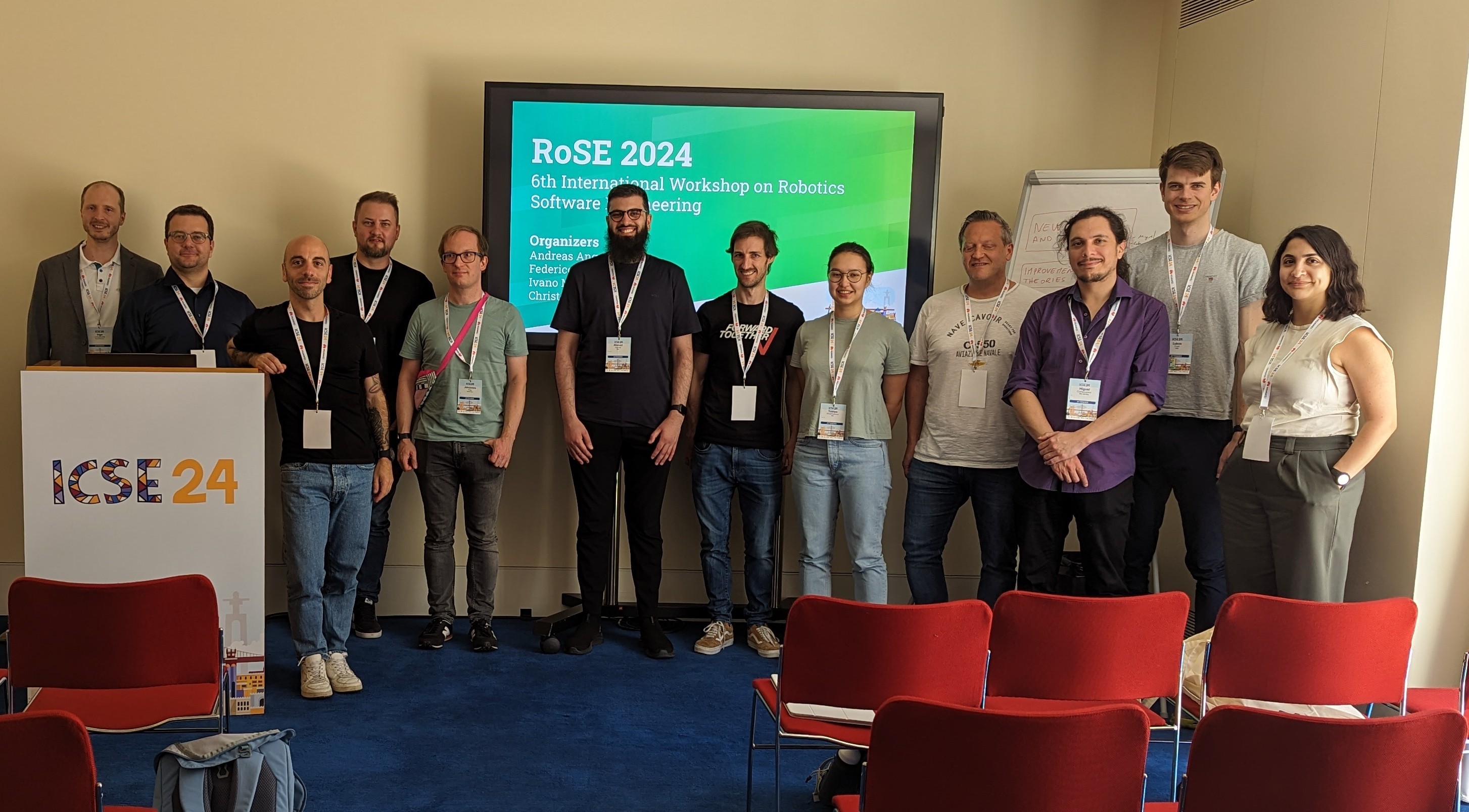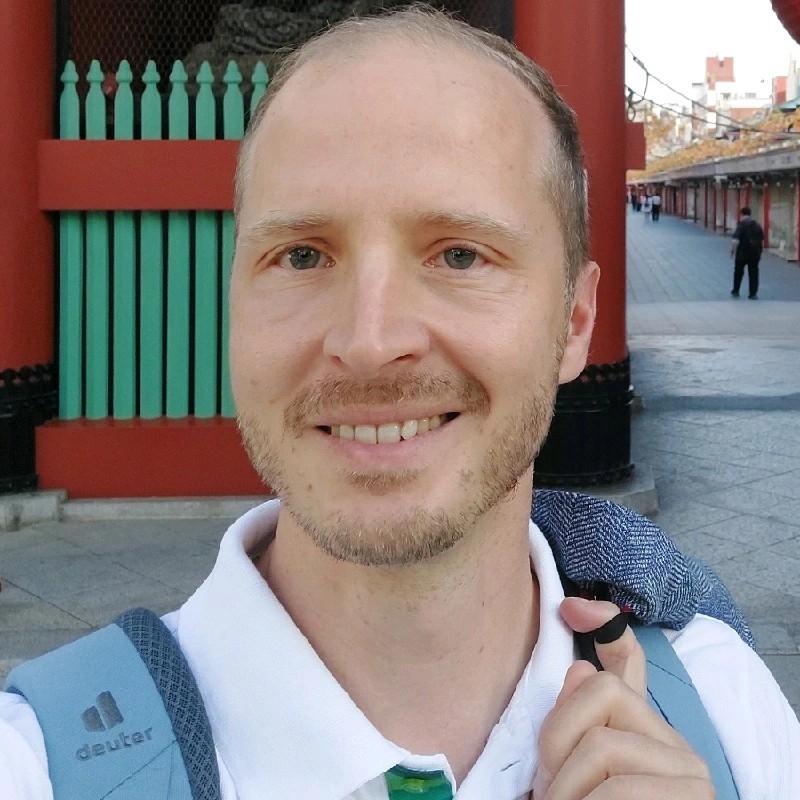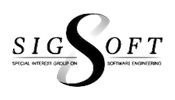6th International Workshop on Robotics Software Engineering (RoSE’24)
- co-located with ICSE 2024
- in-person event in Lisbon, Portugal
- April 15, 2024

Accepted papers
- Michel Albonico, Paulo Júnior Varela, Adair José Rohling and Andreas Wortmann. Energy Efficiency of ROS Nodes in Different Languages: Publisher/Subscriber Case Studies
- Johannes Mey, Ariel Podlubne, René Schöne, Paul Gottschaldt, Diana Goehringer and Uwe Assmann. Systematic Testing of a ROS Interface Specification Backend
- Emil Stubbe Kolvig-Raun, Miguel Campusano and Thor Malmby Jørgin. Contextual visualizations for debugging collaborative robots
- Daniel Vojnar, Adela Bierska and Barbora Buhnova. Scenarios for Trust Management in Swarm Robotics
- Abhinav Upadhyay, Alpana Dubey and Shubhashis Sengupta. RoMaViD: Learning Robotic Manipulation from Video Demonstrations
- Ahmad R. Hamid and Mikkel B. Kjærgaard. An Edge Computing Sizing Tool for Robotic Workloads
- Lukas Dust, Mikael Ekström, Rong Gu, Saad Mubeen and Cristina Seceleanu. Towards Automated Verification of ROS 2 Systems - A Model-Based Approach
Theme & Goals
Robotics is one of the most challenging domains for software engineering. Deploying even simple applications requires integrating solutions from several domain experts, including navigation, path planning, manipulation, localization, human-robot interaction, etc. Integration of modules provided by the respective domain experts is one of the key challenges in engineering software-centric systems, yet only one of the cross-cutting software concerns that are crucial to robotics. As robots often operate in dynamic, partially observable, and populated environments, additional challenges include adaptability, robustness, safety, and security.
RoSE aims to bring together researchers and practitioners to identify new frontiers in software engineering for robotics, discuss challenges arising from real-world applications, and transfer the latest insights from research to industry.
Topics of Interest
RoSE 2024 seeks contributions addressing, but not limited to, the following topics related to robotics software engineering:
- Analysis of challenges in robotic software engineering
- Best practices in engineering robotic software
- Continuous integration and deployment in robotics
- Domain-specific languages and tools for the development of robotic software
- Empirical studies of robotics software and software tools, including its usability
- Engineering (heterogeneous) multi-robot systems.
- Identification and analysis of design principles promoting quality of service (e.g., performance, energy efficiency)
- Lessons learned in the engineering and deployment of large-scale, real-world integrated robot software
- Machine learning applied to robotic software
- Metrics measuring non-functional properties (e.g., robustness, availability, etc.) and their application to robotic software
- Mining software repositories of robotic systems
- Model-Driven Engineering methods and techniques applied to robotic software
- Processes and tools supporting the engineering and development of robotic systems
- Software architecture of robotic systems
- State-of-the-art research projects, innovative ideas, and field-based studies in robotic software engineering
- Static and dynamic analysis of robotic software
- Usability studies of robotics software and tools
- Variability, modularity, and reusability in robotic software
- Validation and verification of robotic software
Keynotes
We are happy to host Ingo Luetkebohle as this year’s keynote speaker.

Ingo Luetkebohle is a Senior Group Lead at Bosch Research and works on methods and tools for supporting software teams in robotics and IoT. In the past couple of years he has focused on making it easier for developers to analyze the runtime behaviour of systems, and to prevent common timing and consistency errors beforehand. More technically, diagnostics, tracing, data analysis, visualization, a bit of modelling and code generation. He is also very interested in DevOps for Robotics, and generally making the feedback cycle shorter, starting in tools such as IDEs, going all the way to deployment and maintenance. Ingo loves and contribute to Open Source, UX aspects and, hopefully, making the world a better place for our kids. PhD in model-driven architecture and integration for communicative robots. Research based on the successful delivery of three significant system iterations during this time.
Seeing the forest instead of the trees: Assessing context of use for robotics software engineering methods and tools. The choice and subsequent introduction of methods and tools for software engineering is often difficult due to differences in opinion about their benefit. Some of these discussion even become heated, and can lead to long-standing opposition. At least one reason is often a lack of context, meaning that the constraints, desired qualities and market objectives are not clear. Very few things are so universally useful that they can be judged without context. And beyond technical considerations, there is also often a cost dimension to consider – the benefit of a certain improvement may be too small to warrant its cost. In this talk, I will first relate common context characterization and cost-benefit analysis approaches to common differences we find in robotics use cases, to aid in choice of methods and tools. Regarding the adoption of new methods, I show how we have overcome some common barriers to adoption in our projects. Finally, I will comment on a somewhat long-standing rift in tool approaches in the European research community and provide some opinions on how context characterization could be helpful in overcoming it.
Workshop Program
Times are displayed in WET (GMT+01:00).
The workshop will take place in room Cottinelli Telmo.
| Time | Title | Who | Slot |
|---|---|---|---|
| 09:00 | Welcome to RoSE ‘24 | RoSE’s OC | |
| 09:15 | Keynote – Seeing the forest instead of the trees: Assessing context of use for robotics software engineering methods and tools | Ingo Luetkebohle | |
| 10:05 | Session 1 | Chair: Ivano Malavolta | |
| Energy Efficiency of ROS Nodes in Different Languages: Publisher/Subscriber Case Studies | Michel Albonico, Paulo Júnior Varela, Adair José Rohling and Andreas Wortmann | 20+5 min | |
| 10:30 | Coffee break | ||
| 11:00 | Session 2 | Chair: Andreas Angerer | |
| Scenarios for Trust Management in Swarm Robotics | Daniel Vojnar, Adela Bierska and Barbora Buhnova | 20+5 min | |
| RoMaViD: Learning Robotic Manipulation from Video Demonstrations | Abhinav Upadhyay, Alpana Dubey and Shubhashis Sengupta | 20+5 min | |
| Systematic Testing of a ROS Interface Specification Backend | Johannes Mey, Ariel Podlubne, René Schöne, Paul Gottschaldt, Diana Goehringer and Uwe Assmann | 15+5 min | |
| Contextual visualizations for debugging collaborative robots | Emil Stubbe Kolvig-Raun, Miguel Campusano and Thor Malmby Jørgin | 10+5 min | |
| 12:30 | Lunch break | ||
| 14:00 | Session 3 | Chair: Andreas Angerer | |
| A Model-Based Methodology for Automated Verification of ROS 2 Systems | Lukas Dust, Mikael Ekström, Rong Gu, Saad Mubeen and Cristina Seceleanu | 20+5 min | |
| An Edge Computing Sizing Tool for Robotic Workloads | Ahmad R. Hamid and Mikkel B. Kjærgaard | 10+5 min | |
| 14:40 | Interactive discussion: | All participants | |
| 15:30 | Coffee break | ||
| 16:00 | Interactive discussion: | All participants | |
| 17:00 | Wrap-up & closing of RoSE ‘24 |
Submission Guidelines
Prospective participants are invited to submit
- research papers presenting novel contributions on advancing software engineering in robotics (max. 8 pages);
- challenge showcase papers describing robotics challenges considered insufficiently addressed from an industry perspective (max. 6 pages);
- lessons learned papers describing lessons learned in the collaboration between the two communities of software engineering and robotics (max. 6 pages);
- vision papers on the future of software engineering in robotics (max. 4 pages);
- tool and project papers on software engineering in robotics (max. 4 pages).
Workshop papers must follow the ICSE 2024 formatting instructions, but will use a single blind submission process. All submitted papers will be reviewed on the basis of technical quality, relevance, significance, and clarity by the program committee. All workshop papers should be submitted electronically in PDF format through the EasyChair portal at this link: https://easychair.org/conferences/?conf=rose2024.
Accepted papers will become part of the workshop proceedings. The official publication date is the date the proceedings are made available in the ACM or IEEE Digital Libraries. This date may be up to two weeks prior to the first day of ICSE 2024. The official publication date affects the deadline for any patent filings related to published work. Purchases of additional pages in the proceedings is not allowed.
Important Dates
09 Nov. 202307 December 2023: Workshop Papers Submission21 Dec. 202311 January 2024: Workshop Papers Acceptance Notification25 Jan. 202425 January 2024: Workshop Papers Camera Ready- 15 April 2024: Day of the Workshop
Organizing Committee
- Andreas Angerer (XITASO GmbH, Germany)
- Federico Ciccozzi (Mälardalen University, Sweden)
- Ivano Malavolta (Vrije Universiteit Amsterdam, The Netherlands)
- Christopher S. Timperley (Carnegie Mellon University, USA)
Program Committee
- Mark Adamik, Vrije Universiteit Amsterdam, The Netherlands
- Allison Thackston, Waymo, USA
- Alwin Hoffmann, XITASO GmbH, Germany
- Andreas Wortmann, University of Stuttgart, Germany
- Mahsa Varshosaz, IT University of Copenhagen, Denmark
- Bradley Schmerl, Carnegie Mellon University, USA
- Carlos Hernandez Corbato, TU Delft, The Netherlands
- Charles Lesire-Cabaniols, French Aerospace lab (ONERA), France
- Daniel Sykes, Ocado Technology, UK
- Darko Bozhinoski, Université libre de Bruxelles, Belgium
- David Garlan, Carnegie Mellon University, USA
- Davide Brugali, Università degli Studi di Bergamo, Italy
- Davide Di Ruscio, Università degli Studi dell’Aquila, Italy
- Floris Erich, National Institute of Advanced Industrial Science and Technology, Japan
- Holger Giese, Hasso Plattner Institute at the University of Potsdam, Germany
- Jan Broenink, University of Twente, The Netherlands
- Jesús Martínez, Universidad de Málaga, Spain
- Juergen Dingel, Queen’s University, Canada
- Michel Albonico, Technological Federal University of Paraná, Brasil
- Nadia Hammoudeh Garcia, Fraunhofer Institute for Manufacturing Engineering and Automation IPA, Germany
- Nico Hochgeschwender, University of Applied Sciences Bonn-Rhein-Sieg, Germany
- Patrizio Pelliccione, Gran Sasso Science Institute, Italy
- Ricardo Sanz, Universidad Politecnica de Madrid, Spain
- Robert Bocchino, Jet Propulsion Laboratory, California Institute of Technology, USA
- Rogardt Heldal, HLV, Norway
- Sebastian Wrede, CoR-Lab, Bielefeld University, Germany
- Simos Gerasimou, York University, UK
- Trenton Tabor, Carnegie Mellon University, USA
- Michael Fisher, University of Manchester, UK


